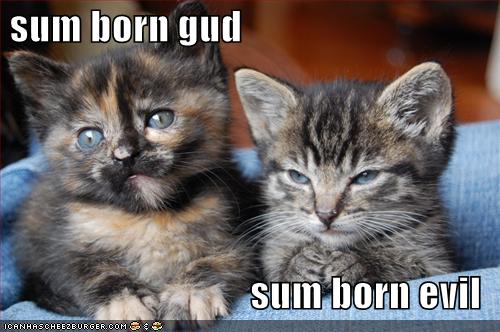Having alignment as an in-game mechanic has nothing to do with having distinct paths in a game.
Might & Magic VII is an example to the contrary. It starts out without any moral choices, but about midgame it imposes a choice between two extremes (light and dark), and it even imposed the "neat little titles" that you mentioned as being synonymous with alignment. This refutes your point that alignment and distinct paths in a game aren't connected.
How the hell does that refute anything?
Do you even know a logical fallacy when it bites your ass? Or is it just your lack of reading comprehension?
First of all, alignment is how a character sees themselves and is more or less a personal choice (through actions and in some systems through character building). Reputation is how the rest of the world sees the character as a result of their actions.
Second, while alignment is personal, reputation can be global (simplistic), local, faction, personal (to a specific other person).
Very well, let's take apart the terms we're talking about, why not. Of course you are wrong about alignment being a solely personal choice; for the term "alignment" to have any meaning at all, there need to be some standards in regards to which the character can be "aligned" or not. These standards will often be universal concepts like good and evil, which in turn will be represented in some way in that game's world; gods tend to embody these principles for example. But also all other factions in that game's world will be positioned somewhere on that alignment axis, which will in turn influence your standing with them, or your chances to get into contact with them at all. Bandits won't accept a lawful character, and I'm reiterating my point that there is no reason to let the player switch his behaviour like a completely erratic retard, so your alignment
will influence your actions and how others perceive you. Your differentiation between alignment and reputation is therefore arbitrary.
And again, it would only take minute amounts of trace intellect to figure out that what you are reading into my words ("players expect exactly the same things of a CRPG that they expect in P&P") has nothing to do with what I said ("the context is what motivates a player to have their character make good/evil/moral choices and in that respect no, there is absolutely no difference between PnP and cRPG").
You're right, you just used another meaningless filler word here (as you seem to like doing), "the context". If you manage to be coherent for long enough so you can explain of what context exactly you're talking here, that'd be neat.
You have to care about it if the consequences in-game are harsh enough.
This is simply ridiculous BS.
Simple example: An evil character encounters a rich, lone merchant in the wilderness. Now let's assume that stealing from this merchant is not an option (picking pockets is rarely implemented very well), so you could only kill him. This in turn would cause your reputation to instantly drop so low that you'll be attacked on sight in all civilized areas, making the game impossible to win w/o cheating. Now while your character would usually have no qualms about stealing or killing, you might want to think twice about it. This example may just be culled from Baldur's Gate.
Again, I think your perceptions of roleplaying outside of videogames get in the way here, where such things aren't subject to engine limitations.
Note to self: I should have explained my definition of alignment right away instead of arguing with some loon afterwards.
Debating with Shemar is like arguing with Cleve Blakemore if Cleve had Down Syndrome.
feel free to keep alt-trolling
Paranoid much?

you will be ignored from now on.
Make my day.










 ) you'll see what it's like.
) you'll see what it's like.





